International Coffee Day 2023 – #CoffeePeople Campaign
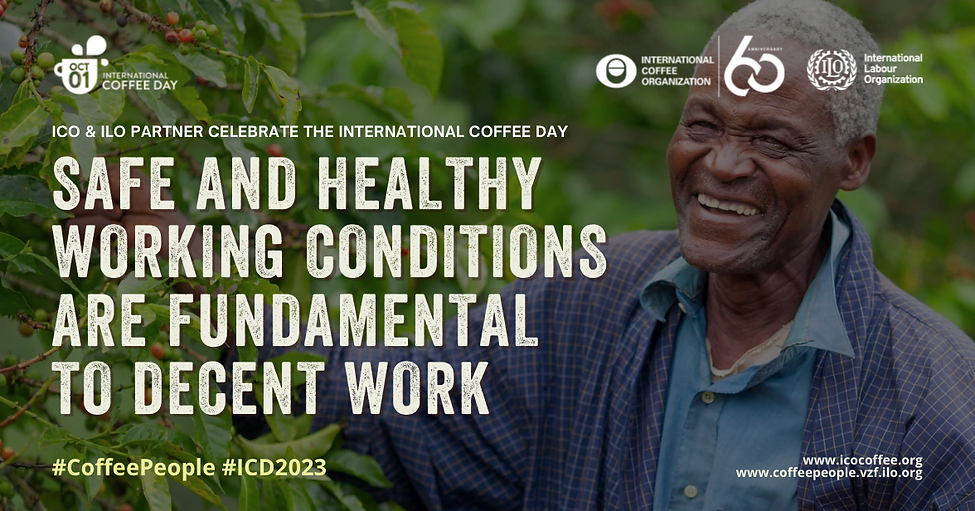
In commemoration of this year’s International Coffee Day on October 1st, 2023, the International Coffee Organization (ICO) and the International Labour Organization (ILO) have joined forces to spearhead an EU-funded campaign under the motto #CoffeePeople. International Coffee Day marks an annual tribute to the dedication of coffee farmers, and everyone involved in bringing coffee to our cups. This year’s campaign shines a light on the unsung heroes in the coffee industry – the workers driving the entire supply chain.
Under the overarching mission of “promoting the right to a safe and healthy working environment in the coffee supply chain”, this campaign seeks to unite stakeholders from across the coffee sector to advocate for workers’ rights. At the core of the initiative lies the ILO’s Vision Zero Fund, striving to eradicate work-related accidents, injuries, and illnesses within supply chains worldwide. It provides the framework for the campaign’s purpose and ambition.
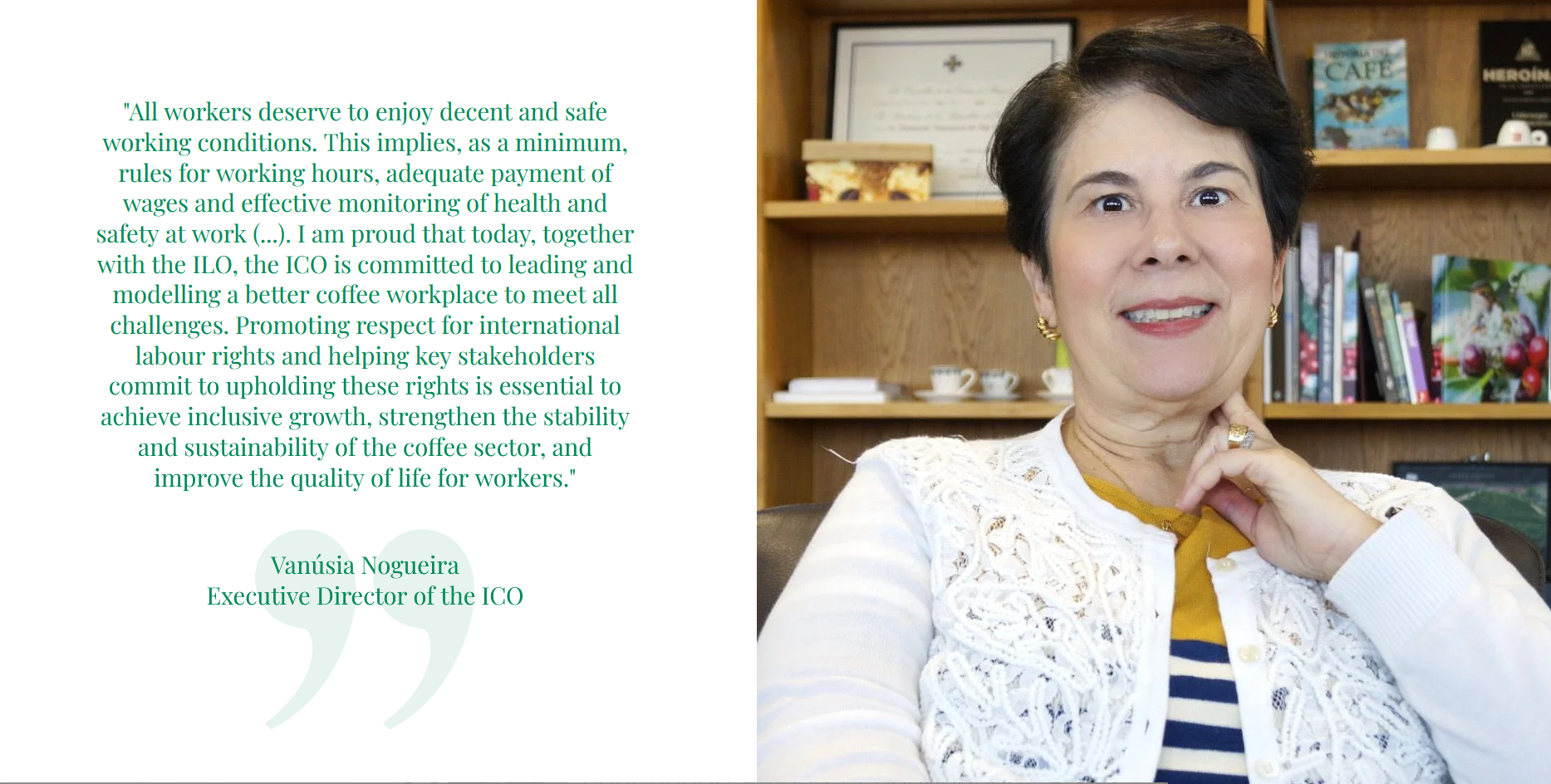
Recognizing that actions speak louder than words, the #CoffeePeople Campaign encourages stakeholders to not merely express support but to commit to concrete pledges aligned with this year’s theme. Through these commitments, the campaign aims to kickstart real, meaningful improvements in the health and well-being of workers in coffee supply chains.
4C is happy to announce that we are responding to this call to action with our own pledge dedicated to promoting the right to a safe and healthy working environment for everyone in the coffee supply chain.

What makes coffee a dangerous industry for workers?
Every worker in the coffee supply chain deserves a safe and healthy working environment yet they regularly experience preventable work-related injuries and illnesses. According to the ICO, major safety and health hazards in coffee agriculture are:
- Injuries from cutting tools ranging from skin abrasions and minor cuts to severe wounds
- Injuries from contact with, or entanglement in, unguarded machinery or from being hit by motorized vehicles
- Hearing loss or impairment due to noisy machinery
- Musculoskeletal injuries from repetitive and forceful movements, and lifting and carrying heavy or awkward loads
- Poisoning and long-term health problems from pesticide use or exposure
- Respiratory problems due to exposure to coffee dust
- High levels of sun exposure which can result in skin cancer and heat exhaustion
- Snake and insect bites
- Long working hours
- Stress
The International Journal of Environmental Research and Public Health conducted a study on effects of pesticide use in coffee farms. The most frequently pesticides-related symptoms reported included strong tiredness, stomachache, irregular heartbeat, sleeplessness, difficulty breathing, dizziness, and visual problems. The high incidence of pesticide-related symptoms and diseases can be attributed to improper pesticide use, coupled with a deficient or largely absent legislative frameworks and a lack of oversight by authorities.
Food insecurity and hunger are further global issues that have a major effect in many coffee growing regions. Food insecurity leads to a wide range of serious health issues, and its effect on mental and physical wellbeing goes beyond poor nutrition and diet. For instance, according to a study, nearly 50% of adults residing in households with severe food insecurity reported having to delay, reduce, or forgo prescription medications due to financial constraints.
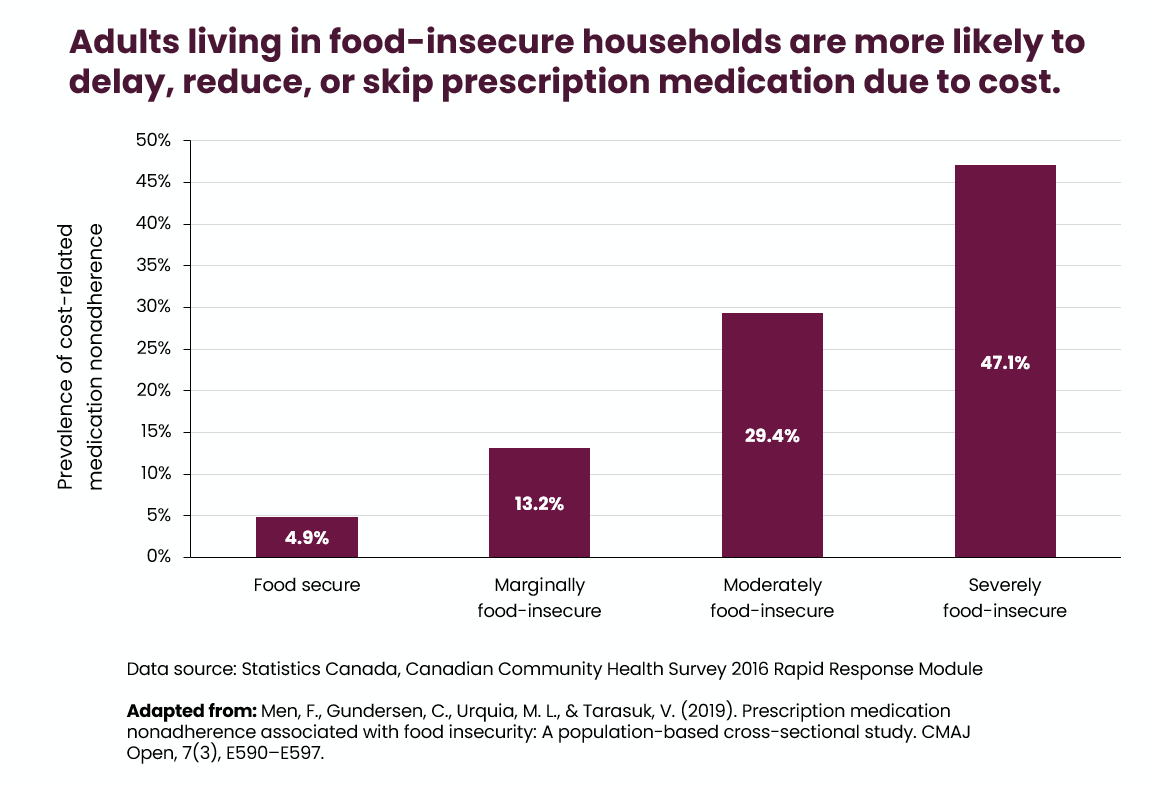
How the 4C System addresses workers’ health and safety
The 4C Code of Conduct comprises our principles across the economic, social, and environmental dimensions of sustainability. To become certified, 4C Units need to comply with the 4C Code of Conduct requirements, which is verified by independent third-party auditors who closely follow 4C’s guidance in ensuring compliance and making certification decisions.
The 4C Code of Conduct outlines comprehensive requirements to protect workers’ health and safety in 4C certified farms and processing facilities.
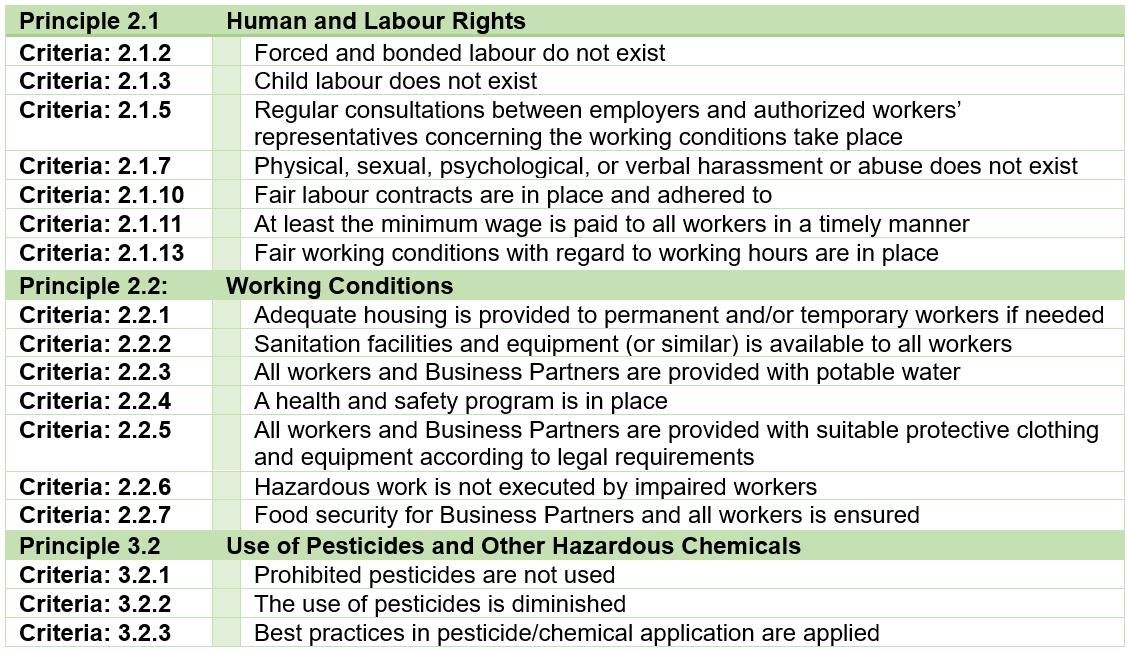
In addition to the core 4C certification, we offer solutions to system users who wish to commit deeper to Human Rights Due Diligence and proactively address identified threats in their supply chains. Together with the Food Security Standard, founded by Welthungerhilfe, WWF and the German Ministry for Food and Agriculture, we have created the Food Security Add-On which is adapted specifically for addressing hunger and food insecurity in coffee supply chains. The Food Security Add-On features an extended checklist ensuring the dedicated promotion of workers’ health and safety. Find out more about the Food Security Add-On and contact us if you are interested in applying this innovative additional 4C certification in your coffee production.
How 4C pledges to further strengthen the protection of workers’ health and safety
As outlined in our pledge, 4C is committed to enhancing workers’ health, safety, and well-being by refining our system and requirements on working condition in 2024. Our dedication to continuous improvement is central to the 4C system.
Currently, we are revising the 4C Audit Checklist in line with international standards, laws, and regulations, while also incorporating valuable feedback from system users. This document is pivotal in our system, guiding auditors in ensuring compliance with the 4C Code of Conduct, which sets the standard for certification decisions.
The revisions of the Audit Checklist include:
- A clearer guidance on warning signs on farms and facilities such as wet mills, dry mills, and warehouses. Communication plays a pivotal role in ensuring the safety and well-being of workers and warning signs are an effective and cost-efficient solution to mitigate health risks, prevent accidents and ensure safety.
- Information about available options for health checks and healthcare services must be provided to all permanent, temporary, and seasonal workers.
- A documented emergency plan must be in place and communicated effectively to all workers to ensure its seamless execution in the event of an emergency.
- More detailed instructions on inspecting equipment and machinery to ensure safe use by both farmers and their workers. This encompasses demonstrating that equipment and machinery are well-maintained and regularly serviced and manufacturers’ guidelines and relevant regulations for calibration and servicing of equipment, machinery, and pesticide and fertilizer application equipment must be followed diligently.
The revisions to the Audit Checklist benefit not only the workers themselves but also extend to the surrounding communities. Farmers, who are part of the 4C System, are required to assess the potential impact of their operations on neighboring communities. This practice indirectly safeguards the well-being of the workers not only at their workplace but also in their homes and among their families.
4C is fully committed to elevating workers’ health, safety, and well-being, fostering a safer and more responsible coffee industry for all. We would like to extend our genuine gratitude to the ICO and ILO for highlighting this crucial issue on International Coffee Day 2023.
4C partners with JDE Peet’s and DEG to reduce GHG emissions and strengthen climate resilience of smallholder producers

4C Services and JDE Peet’s are proud to announce the start of a joint project on “Reducing GHG emissions and increasing yields from Robusta coffee production by 7,000 smallholder farmers and processors in Tanzania”, co-financed by DEG – Deutsche Investitions- und Entwicklungsgesellschaft mbH – with funds of the develoPPP.de program of the German Federal Ministry for Economic Cooperation and Development (BMZ), together with funds of JDE Peet’s and 4C Services GmbH.
The project was successfully launched on 09 August 2021. Its main objective is to reduce GHG emissions from Robusta coffee production by smallholder farmers and processors in Tanzania within the JDE Peet’s supply chain by measuring and assessing the carbon footprint of coffee production, implementing mitigation strategies, supporting market uptake of climate friendly coffee and with this, creating positive socio-environmental benefits for the farmers and local communities of the coffee sector in Tanzania and beyond.
Environmental impact of coffee production in Tanzania and how it is addressed by the project

Coffee production has an impact on GHG emissions due to land use change/deforestation, non-regenerative soils which lack the potential to sequester carbon and poor agricultural and processing practices. Coffee cultivation accounts for approx. 90% of the product carbon footprint of roasted coffee. To successfully tackle these challenges, it is crucial to first get an in-depth insight of the drivers of GHG emissions in Robusta coffee production in the region, to then find adequate solutions for reducing these emissions on farm level and throughout the entire supply chain.
In cooperation with the implementing partners Touton S.A. and Karagwe District Cooperative Union (KDCU Ltd.) the project will quantify the carbon footprint of green coffee bean production in the Kagera region in Tanzania and identify potential reduction measures. Such measures will be implemented through the training of master trainers and the set-up of demonstration plots. The measures will be further integrated into the 4C Climate Friendly Coffee Add-on which will also be piloted with the farmers in the region. This will create market opportunities, support farmers in their efforts towards climate change mitigation and adaptation and at the same time facilitate coffee companies to work towards their climate neutrality goals.
“We are very happy to partner with 4C Services, DEG, Touton S.A and KDCU supporting over 7,000 smallholder farmers in Kagera, Tanzania to reduce GHG emissions through sustainable and climate friendly agricultural and processing practices. Tanzania is an important coffee origin that is critical towards safeguarding the rich diversity of coffee.” – Nadia Hoarau-Mwaura, Sustainability Director at JDE Peet’s
“We are very excited that together with our supply chain partners 4C will take action to measure GHG emissions in Robusta coffee production in Tanzania and support 7,000 farmers in the implementation of reduction measures.” – Dr. Norbert Schmitz, 4C Managing Director. “Through this common effort, we want to take the next step to assessing the carbon footprint and making climate friendly coffee supply chains a reality.”
About the develoPPP.de program
 develoPPP.de is a program launched by the German Federal Ministry for Economic Cooperation and Development (BMZ) in 1999 in order to foster the involvement of the private sector in areas where business opportunities and development policy initiatives overlap. DEG is one of the two official partners appointed by BMZ to implement the develoPPP.de program on its behalf.
develoPPP.de is a program launched by the German Federal Ministry for Economic Cooperation and Development (BMZ) in 1999 in order to foster the involvement of the private sector in areas where business opportunities and development policy initiatives overlap. DEG is one of the two official partners appointed by BMZ to implement the develoPPP.de program on its behalf.
For almost 60 years, DEG has been a reliable partner to private-sector enterprises operating in developing and emerging-market countries. Since the launch of the develoPPP.de program, DEG has implemented over 1,000 develoPPP.de projects worldwide.
4C is pleased to announce that the 4C certification will be a recognized partner program of Keurig Dr Pepper (KDP) to support its commitment to 100% responsibly sourced coffee. KDP is a leading beverage company in North America and is committed to sourcing, producing, and distributing beverages responsibly through its “Drink Well. Do Good” corporate responsibility platform. KDP has developed a rigorous set of requirements for the acceptance of independent product-specific standards across its supply chains. After comprehensive benchmarking, the 4C certification was recognized as one of the standards that is well aligned with the KDP Supplier Code of Conduct and additional program considerations laid out by KDP. In addition, KDP will be also be requiring its upstream suppliers to undergo Chain of Custody certification audits conducted by a third party, which is currently voluntary for 4C participants beyond the farm level.
“4C is happy to support KDP in strengthening its supply chain sustainability and promoting human rights and good agricultural practices around the world,” – says Norbert Schmitz, Managing Director at 4C.


“KDP is pleased to announce that the latest evolution of the 4C certification program means that it meets KDP’s requirements for approved Responsible Sourcing partner programs. We look forward to working in partnership with 4C to continuously improve their program and to tackle the significant challenges facing the coffee sector”. – Whitney Kakos, Sr. Manager, Sustainability at Keurig Dr Pepper.
Learn more: Keurig is committed to 100% Responsibly Sourced Coffee
4C partners with Melitta Europa and DEG to foster sustainability of the Colombian coffee production

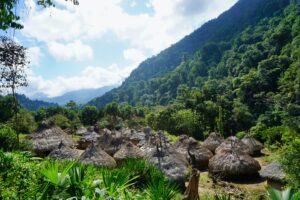 Magdalena is a Colombian department with a magnificent landscape that stretches from a wide plain in the southern area to the Caribbean Sea in the north. The region is known for the topical humid climate which allows productive activities like palm oil, banana and coffee. It also boasts a beautiful mountainous complex of the Sierra Nevada de Santa Marta which is the highest coastal mountain on Earth and one of the country´s most biodiverse regions. However, Magdalena is also one of the departments with the highest rates of rural poverty and youth unemployment in Colombia, as well as one affected greatest by the impact of climate change.
Magdalena is a Colombian department with a magnificent landscape that stretches from a wide plain in the southern area to the Caribbean Sea in the north. The region is known for the topical humid climate which allows productive activities like palm oil, banana and coffee. It also boasts a beautiful mountainous complex of the Sierra Nevada de Santa Marta which is the highest coastal mountain on Earth and one of the country´s most biodiverse regions. However, Magdalena is also one of the departments with the highest rates of rural poverty and youth unemployment in Colombia, as well as one affected greatest by the impact of climate change.
Magdalena is the region that was selected for the implementation of a three-year 4C sustainability project.
This project is conducted by 4C and its partners Melitta Europa GmbH & Co. KG and Deutsche Investitions- und Entwicklungsgesellschaft mbH (DEG) and aims to improve sustainable agricultural management of Colombian coffee growers and market uptake in Europe to contribute to the long-term economic and ecologic viability of smallholder farms, thus, increasing the attractiveness of the sector for young adults.
Decision making supported by remote sensing technology
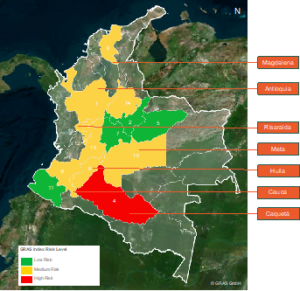 A balanced combination of remote sensing technologies, market links, local synergies and a baseline study were crucial for choosing the focus region of the project.
A balanced combination of remote sensing technologies, market links, local synergies and a baseline study were crucial for choosing the focus region of the project.
Global Risk Assessment Services (GRAS) conducted a “bird´s eye view” analysis and used data on protected areas, high carbon stock areas, potential deforestation, converted grassland and national social indices to define a risk index for each department. For an initial preselection of departments, these results were analysed with Melitta and compared with possible synergies with other similar projects.
Then 4C´s local partners Alliance for Bioversity International (ABC) and the International Center for Tropical Agriculture (CIA) compiled key information on the main social, environmental and economic challenges that make coffee production risky and volatile as well as unappealing for young adults. Major challenges for coffee farmers, found by the study, include high costs of coffee production, low productivity, lack of farm and income diversification, risk of deforestation and negative impact of climate change. The identified drivers for young adults to migrate to the cities and leave coffee production were the unattractiveness of the coffee sector due to heavy work, low income and absence of social recognition as well as the lack of access to capital and land.
Bringing together local and international partners
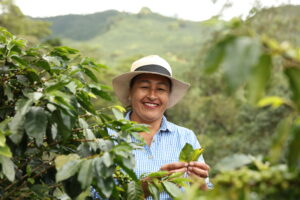 In November 2020, 4C brought together 38 participants from NGOs, companies and local coffee cooperatives at an online multistakeholder workshop to present these findings. The workshop was an opportunity for stakeholders to discuss the main challenges and possible solutions. Furthermore, stakeholders exchanged ideas on how to better integrate youth in the Colombian coffee sector. Following the initial assessments and the workshop, 4C and its partners identified the department of Magdalena as the one with the greatest need for project intervention and defined the most relevant training topics.
In November 2020, 4C brought together 38 participants from NGOs, companies and local coffee cooperatives at an online multistakeholder workshop to present these findings. The workshop was an opportunity for stakeholders to discuss the main challenges and possible solutions. Furthermore, stakeholders exchanged ideas on how to better integrate youth in the Colombian coffee sector. Following the initial assessments and the workshop, 4C and its partners identified the department of Magdalena as the one with the greatest need for project intervention and defined the most relevant training topics.
“Through the active participation of various actors from the coffee industry, including coffee producers, traders, roasters, NGOs and research institutions, we are glad to have received a broad input on the main challenges to be addressed within the training program that we are in the process to develop together with FNC, ABC and NES Naturaleza, as well as input on training methodologies to be applied”, highlights Myriel Camp, Program Manager at 4C Services.
In comparison to the other six departments assessed, Magdalena showed low productivity, the highest rates of rural poverty, youth unemployment and lack of rural education. It was also one of the departments affected greatest by the impact of climate change, a risks losing the remaining forest due to deforestation. A decrease of almost 50% in a suitable area for coffee production is predicted. In addition, coffee productivity in Magdalena amounts to 0.71 tons/hectare, which is only half of that of departments such as Antioquia, Huila and Risaralda. Access to international markets for coffee represents only 2% of the total coffee exports from Colombia, in comparison to 10%-18% in the best performing departments.
When it comes to improved attractiveness of the sector for young adults, the baseline study revealed the demand for greater opportunities in terms of employability and strengthening youth initiatives and access to capital for implementing business ideas in the coffee industry.
“Having identified Magdalena as the project implementation region to best achieve impact on the ground and where the most need for intervention exists, fits into our vision, among other things, to support the market access of the farmers of the project. Magdalena is a region from which we source green coffees. Supporting here with our project to improve the livelihoods of coffee farmers and young adults makes us very happy”, says Jan Rischkopf, Sustainability Manager at Melitta Europa GmbH & Co. KG.
Engaging beneficiaries and local actors
In early 2021, the work in Magdalena began. The project was socialized with the coffee growers committee of Magdalena and with their support the target beneficiaries have been identified. Via radio program, SMS, posters and field visits, farmers and young adults are going to be informed about the project objectives and motivated to participate. Field visits to potential project beneficiaries, planned to start mid-March, will be led by experienced agronomists from the region. Measuring the impact is an important component of the project, the field officers will use a phone application developed by GRAS to collect the baseline data of the selected beneficiaries and in this way measure change over the timeframe of the project.
In addition, the project’s training program is currently under development in cooperation with the Federación Nacional de Cafeteros de Colombia (FNC), one of the main implementing partners of the project. “For the FNC it is a commitment to work for the well-being of Colombian coffee growing families and the development of the country, and therefore we are proud to work with allies such as 4C to generate value through the development of projects that increase the opportunities and profitability of coffee growers,” says Diego Robles Marcucci, Sustainable Trade Specialist at FNC. He added: “Through the Comité de Cafeteros del Magdalena, we work in this coffee-growing department, which includes around 5,000 producers to whom we provide services such as technical assistance in cultivation through the Facilitated Extension Service, purchase guarantees, scientific research and the promotion of Colombian coffee.”
Trainings’ topics, identified during the multistakeholder workshop, include, among others, the adoption of climate-smart agricultural practices and improving marketing and business skills for emerging businesses. The training program is the key component to bring changes in the sector. Different training approaches and methodologies will be applied, ranging from train-the-trainer trainings to demonstration farms serving as training ground and field schools for farmers and young adults. To enable the implementation of the learnings from the training, the project will support these activities with financial contributions for required investments.
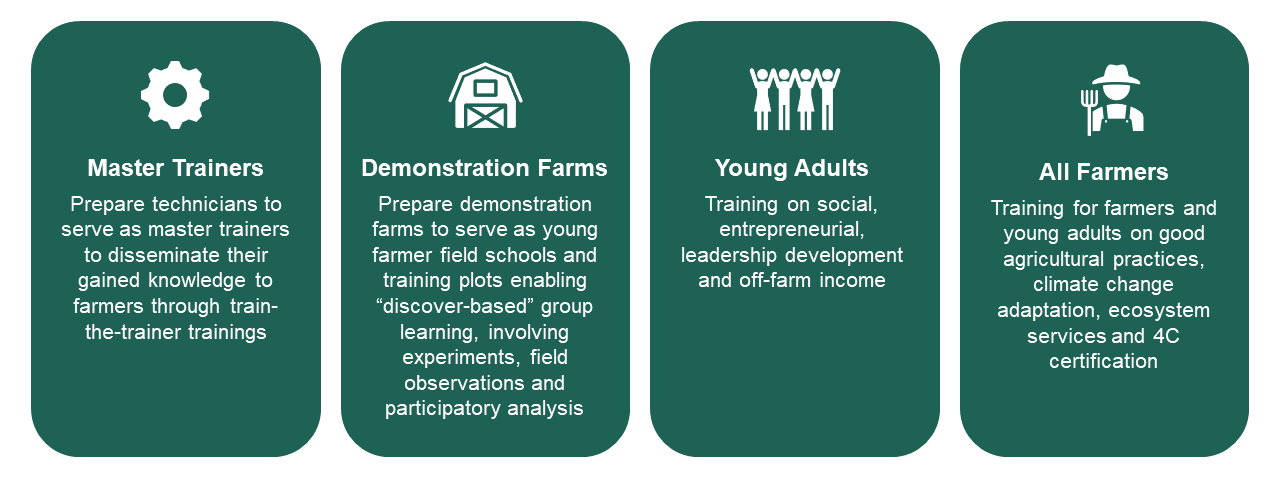
“Within the framework of the DeveloPPP project, we will be able to generate important synergies with relevant actors in the supply chain to contribute to the profitability of coffee growing and the well-being of coffee growers”, concluded Diego Robles Marcucci from FNC.
Further information on the project and the results of the baseline study can be found here.
About the develoPPP program
develoPPP is a program launched by the German Federal Ministry for Economic Cooperation and Development (BMZ) in 1999 in order to foster the involvement of the private sector in areas where business opportunities and development policy initiatives overlap. DEG is one of the two official partners appointed by BMZ to implement the develoPPP program on its behalf.

Gevalia, a traditional brand owned by Jacobs Douwe Egberts (JDE) with a 150-year history and the largest coffee roastery in Scandinavia, believes that making delicious coffee must go hand in hand with caring for the planet. To reduce its environmental impact along the bean to cup journey, Gevalia sources 4C certified coffee to support sustainable farming, uses renewable energy, recycles production waste, and re-thinks filter coffee packaging in terms of recyclability and material use in general. This information will soon be included on Gevalia’s coffee packs to enable more visibility and increase awareness of its contribution to sustainable development for the end-consumer.
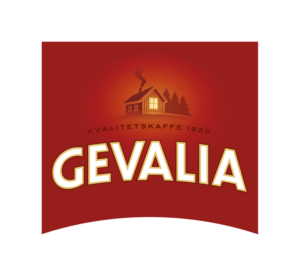
“JDE is proud of the long-standing partnership we have with 4C, this collaboration with Gevalia demonstrates our commitment to responsible sourcing and supporting sustainable coffee farming,” – says Nadia Hoarau-Mwaura, Sustainability Director at Jacobs Douwe Egberts. The launch of the new claim on-pack was included in the agenda of the JDE Online Trade Event with the focus on sustainability where JDE presented its coffee brands and sustainability undertakings to a versatile group of Scandinavian retailers. 4C participated in this event to introduce the 4C standard, its requirements, and the latest developments, including innovative solutions such as satellite images to support risk assessment during the certification process as well as the 4C Climate Friendly Coffee concept. “4C is pleased to support Gevalia in its sustainability efforts and hopes that responsible sourcing trends will increase in the coming years on a global scale,” – adds Norbert Schmitz, Managing Director at 4C Services GmbH.
Further Information – Downloads and Links
The Partnership for Gender Equity (PGE), with the support of a group of coffee and cocoa partners including 4C, aims to develop and launch a new tool called the “Gender Equity Index”. It will support companies and organizations which provide services and technical expertise to farmers and farmer groups, enabling them to effectively reach more women.
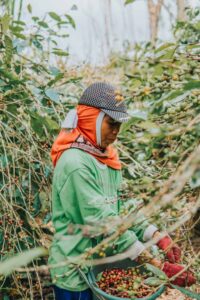 Over 70,000 women cultivate and process 4C certified coffee around the world. The 4C standard prohibits discrimination on a gender basis and ensures that the procedures to act against discrimination and harassment are in place. To strengthen its work on gender equality, 4C has partnered with PGE to support the development of the “Gender Equity Index”.
Over 70,000 women cultivate and process 4C certified coffee around the world. The 4C standard prohibits discrimination on a gender basis and ensures that the procedures to act against discrimination and harassment are in place. To strengthen its work on gender equality, 4C has partnered with PGE to support the development of the “Gender Equity Index”.
Starting from November 2020, 4C has been working on the development of verifiable criteria on gender equality in coffee production to be added to its core certification on a voluntary basis. These criteria will be applied to identify gender inequalities at farms and create action plans, following the continuous improvement framework of the 4C standard. Participating 4C System users will also be able to make credible claims with regards to sustainable 4C certified coffee products which promote gender equality, thus, highlighting their efforts in this area.
The purpose of the “Gender Equity Index” of PGE is to evaluate the design and implementation of advisory and extension services, helping provider organizations to integrate and expand the topic of gender equity in their programs. The “Gender Equity Index” diagnostic will offer recommendations and resources to assist service providers as they prioritize action to address identified gaps.
“Although the 4C Code of Conduct already has a strong linkage to UN SDG 5 on Gender Equality (ITC 2020), we see further potential to deeper address the existing disparities and promote women empowerment on a global scope,” – said Norbert Schmitz, Managing Director at 4C Services GmbH. – “We are hopeful that with this partnership we can contribute to the development of the Gender Equity Index and obtain learnings to strengthen the 4C sustainability standard in terms of gender equality and empowerment of women in the coffee sector.”
Kimberly Easson, CEO at PGE said, “The development of the Gender Equity Index will benefit from input and experience of the 4C team. Their in-kind and financial contribution reflects an understanding that sustainability projects must consider gender in order to drive impact.”
Greg Meenahan, Co-Developer of the Gender Equity Index said, “This represents the first commitment from a sustainability certification organization. It’s a recognition that gender equality needs to move past specific “gender projects” and become seamlessly woven into all sustainability projects and investments.”
About 4C:
4C is a leading sustainability certification scheme for the coffee industry. 4C certification focuses on good agricultural and management practices, including requirements on economic, social and environmental conditions for coffee production and processing in order to establish credible sustainable and transparent supply chains.
About PGE:

The Partnership for Gender Equity (PGE) is creating common tools and methodologies to support the coffee and cocoa industries’ engagement and investment in gender equity across the value chain. These tools will serve to improve the livelihoods of producers and enhance the sustainable supply of quality coffee. Their evidence-based approach comprises three core elements: a validated set of tools, a common language for gender equity and a platform for action that supports scalable investments and action across the sector.
Further Information – Downloads and Links
4C talked to “Coffee and Tea in Russia” and shared some insights into the 4C standard, its history, and how 4C works towards more sustainability in the coffee sector.
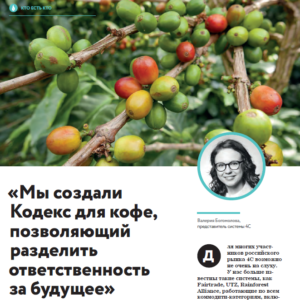 Being one of the global leading systems for certification of sustainable coffee cultivation and processing, 4C plans to strengthen the involvement of market participants in protecting nature, strengthening labor rights, and supporting stable incomes. In her interview for “Tea and Coffee Magazine in Russia”, Valeriia Bogomolova talks about how 4C works and what benefits it creates.
Being one of the global leading systems for certification of sustainable coffee cultivation and processing, 4C plans to strengthen the involvement of market participants in protecting nature, strengthening labor rights, and supporting stable incomes. In her interview for “Tea and Coffee Magazine in Russia”, Valeriia Bogomolova talks about how 4C works and what benefits it creates.
For many participants in the Russian market, 4C may not be very familiar. We have heard of such systems as Fairtrade, UTZ, and Rainforest Alliance, which work in all commodity categories, including coffee. Can you tell us where 4C started?
The Common Code of Coffee Community (4C) was created as a result of extensive multi-stakeholder consultations of global coffee business participants back in 2003-2006. First, it was launched in a form of the 4C Association, declaring the need to introduce basic values into coffee production that would help preserve nature and spread sustainability along the entire chain. The 4C Association worked on several different sustainability topics. One of the key things was the creation of a traceable and independent verification system for coffee which represented the principles stated in the Code of Conduct. The logical outcome of this work was the eventual transformation of the 4C Association in 2015-2016: the 4C Code was operated by Coffee Assurance Services (CAS) while other pre-competitive activities were handed over to the Global Coffee Platform (GCP). In 2018, CAS was acquired by MEO Carbon Solutions and transformed into an independent 4C certification system, operated by 4C Services GmbH.
How does 4C differ from other certification systems?
First of all, we focus exclusively on coffee. This allows us to look deeper into the problems of the coffee industry and quickly find better solutions to meet our stated goals. Furthermore, one of the main environmental criteria for us is the protection of primary forests and areas of high biodiversity. In addition to environmental and social principles, we also put stress on farmers’ economic viability, including principles of business management, capacity development, access to services and market information, and traceability.
Let’s understand how it works. Why does a farmer need this certification?
Participation in our system is a classic win-win situation. Coffee producers are certainly interested in increasing their income and develop their business more sustainably across three well-known dimensions. We make it possible with the help of the criteria laid down in the 4C Code of Conduct, which addresses a large variety of sustainability challenges. That is, coffee certified by 4C, as a rule, costs more than alternatives. The certification procedure itself is not complicated. Any producer can apply for 4C certification and certify their farm in compliance with strict sustainability criteria of the 4C Code of Conduct. Independent auditors conduct on-site audits and evaluations to conclude with issuing a certificate or not. The cost of participating in the 4C certification system for the farmer comes down to the audit price negotiated between the farmers or their cooperative and the independent auditors. For example, in Ethiopia, the cost of the initial audit of one farmer can be 3,200 Euro, but in Brazil, it will be some other price. But I want to point out that this is the amount that the farmer pays to the auditing company, not to us.
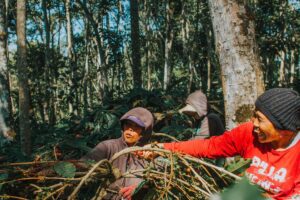
Is it that simple?
Obsivously, not everyone who comes to us initially meets the criteria of compliance Level 2 or Level 3+. That is why we have a system of continuous improvement plans, through which farmers increase their sustainability performance step by step. We are constantly monitoring the development and, thus, encourage coffee producers to improve their farm management methods and take care of people and the environment, which results in a more sustainable and profitable business and increased farmer confidence in the future.
You mentioned that you charge no certification fee. How are your operations financed in this case?
We receive payments from companies that source 4C certified coffee. There is a calculation formula, which is tied to physical volume. We keep a record of all the coffee that passes through our system, which ensures high traceability of 4C certified coffee beans.

So 4C gets its funds from traders and roasters?
Not exactly. 4C gets the financial means from the roasters, coffee brand owners, retailers, etc. Traders only have to be registered on our platform and regularly enter data on 4C coffee purchases to improve supply chain traceability. 4C’s uses its revenue primarily to improve the standard and support farmers through projects on the ground and only partially for marketing and advertising. The companies sourcing 4C certified coffee thereby contribute to a common cause and spread sustainable coffee which is grown following high standards. This is important for them because in many economically developed countries consumers are paying more and more attention not only to the quality of the product but also to the environmental and social responsibility of all those involved in its production chain. The 4C logo appears on the packaging of the finished product, and consumers can see what they support with their small contribution when they buy such a product. So, in a sense, for the image of many market operators who sell the finished product, working with such coffee is gradually becoming something of a must-have.
What is the reach of the 4Cs today? How many countries do your certified farmers work in?
We work in 23 countries. But to give you a better idea, let me give you some other figures. There are nearly 400,000 farmers around the world growing 4C certified coffee working on over 850 hectares of land. And most importantly, it’s more than 26.6 million bags of coffee a year, which is about 15-20% of world consumption.[1] Now we are actively working on increasing recognition of 4C on the consumer markets, especially the developing markets. We have corresponding programs, and we hope that Russian consumers will also soon become part of the supply chain of organic coffee, which has a high social responsibility.
You can find out more about how 4C works and what benefits the coffee sector can get by visiting the organization’s stand in the Coffee Tea Cacao Russian Expo virtual pavilion from March 11.
[1] The figures refer to the year 2019. Click here to see the latest information.
This article was originally published in Russian. To read the original version, please follow the link.